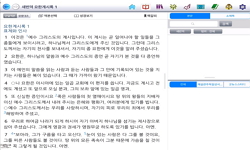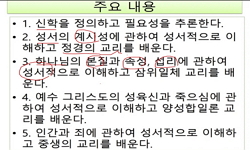이 논문의 목적은 MT 에스더서 고찰에 나타난 하조니의 계시관을 살피고그의 관점을 비평하는 것이다. 하조니는 구약성서 철학에 관한 자신의 삼부작 중첫 번째 책에서 이성과 계시의 이원...
http://chineseinput.net/에서 pinyin(병음)방식으로 중국어를 변환할 수 있습니다.
변환된 중국어를 복사하여 사용하시면 됩니다.
- 中文 을 입력하시려면 zhongwen을 입력하시고 space를누르시면됩니다.
- 北京 을 입력하시려면 beijing을 입력하시고 space를 누르시면 됩니다.

MT와 LXX 에스더 비교를 통한 하나님 역할 연구- 하조니의 관점에 대한 비판을 중심으로 = A Study on the Role of God Through a Comparison of the MT and LXX Esther - A Critique of Hazony's Perspective
한글로보기https://www.riss.kr/link?id=A109773984
-
저자
김동열 (한신대학교)
- 발행기관
- 학술지명
- 권호사항
-
발행연도
2025
-
작성언어
Korean
-
주제어
에스더서 ; 계시 ; 마소라 본문(MT) ; 70인경(LXX) ; 하조니 ; the book of Esther ; revelation ; Masora Text(NT) ; LXX ; Hazony
-
등재정보
KCI등재
-
자료형태
학술저널
-
수록면
41-73(33쪽)
- 제공처
-
0
상세조회 -
0
다운로드
부가정보
국문 초록 (Abstract)
하조니는 하나님을 소개한 에스더서라는 독특한 경전 문학이요 계시와종교의 책을 고찰하는 과정에서, 그의 MT 에스더 고찰에 에스더나 모르드개의고도의 전략과 주도적 행동만 드러났을 뿐 하나님의 직접적 개입은 사실상 없다.
그러나 MT 에스더와 달리, LXX 에스더에서 하나님은 주인공으로서 유대 민족말살의 위기가 있기 전부터 앞서서 행동하신 분이다. 그리고 에스더와 모르드개가신앙적 모험과 도전으로 하나님을 믿고 순종했을 때, 말살의 위험에서 온 유대민족이 구원받을 수 있도록 처음부터 끝까지 그들을 인도하신 분은 하나님이시다.
LXX 에스더에 의하면, 에스더와 모르드개는 역사의 주인공이신 하나님과의관계를 가장 중요하게 생각하며 살아간 투철한 신앙인이다. 그러나 이성과 철학의관점으로, 인간의 영웅적 모험 이야기로서만 풀어간 그는 MT 에스더의 주인공들이하나님으로부터 멀어져 있는 인물이라는 잘못된 설정을 했다. 우리는 구약성서를통해서 앞서가시며 이스라엘 백성을 주도적으로 도우시는 하나님을 만날 수 있다.
하나님의 이름이 없는 에스더서를 통해서도 우리는 시작이요 끝이신 살아계신 하나님을 만날 수 있다.
이 논문의 목적은 MT 에스더서 고찰에 나타난 하조니의 계시관을 살피고그의 관점을 비평하는 것이다. 하조니는 구약성서 철학에 관한 자신의 삼부작 중첫 번째 책에서 이성과 계시의 이원론을 비판하면서 구약성서를 이성과 철학으로보아야 한다고 주장했다. 이후 그는 구약성서를 이성과 인간을 중심으로 볼 수있는 한 방법을 자신의 에스더서 고찰을 통해서 보여주었다. 그렇게 함으로써에스더서, 아니 더 나아가 구약성서의 결론이 인간의 의무와 책임에 관한이야기이며, 그렇게 인간이 용기를 내고 책임을 다할 때, 비로소 하나님의 역사가나타난다고 주장했다.
하조니는 하나님을 소개한 에스더서라는 독특한 경전 문학이요 계시와종교의 책을 고찰하는 과정에서, 그의 MT 에스더 고찰에 에스더나 모르드개의고도의 전략과 주도적 행동만 드러났을 뿐 하나님의 직접적 개입은 사실상 없다.
그러나 MT 에스더와 달리, LXX 에스더에서 하나님은 주인공으로서 유대 민족말살의 위기가 있기 전부터 앞서서 행동하신 분이다. 그리고 에스더와 모르드개가신앙적 모험과 도전으로 하나님을 믿고 순종했을 때, 말살의 위험에서 온 유대민족이 구원받을 수 있도록 처음부터 끝까지 그들을 인도하신 분은 하나님이시다.
LXX 에스더에 의하면, 에스더와 모르드개는 역사의 주인공이신 하나님과의관계를 가장 중요하게 생각하며 살아간 투철한 신앙인이다. 그러나 이성과 철학의관점으로, 인간의 영웅적 모험 이야기로서만 풀어간 그는 MT 에스더의 주인공들이하나님으로부터 멀어져 있는 인물이라는 잘못된 설정을 했다. 우리는 구약성서를통해서 앞서가시며 이스라엘 백성을 주도적으로 도우시는 하나님을 만날 수 있다.
하나님의 이름이 없는 에스더서를 통해서도 우리는 시작이요 끝이신 살아계신 하나님을 만날 수 있다.
다국어 초록 (Multilingual Abstract)
Hazony examined the Book of Esther as literature. He highlights the distinctive absence of any explicit mentions of God in this text. In his reading MT Esther, the narrative emphasizes the strategic actions of Esther and Mordecai, portraying them as autonomous agents who navigate crisis without divine interventions. But in LXX Esther unlike MT Esther, God is the protagonist, acting in advance of the crisis that threatens to exterminate the Jewish people. And when Esther and Mordecai trusted and obeyed God in a faithful venture and rose to the challenge, it is God who guided them from beginning to end so that the entire Jewish people could be saved from the danger of annihilation.
According to the LXX Esther, Esther and Mordecai were staunch believers who lived their lives with their relationship with God being the most important consideration, the protagonist of history. However Hazony incorrectly concluded that the main characters of MT Esther were persons who were distant from God. He misreads the most important figures of Esther and Mordecai as mere secular heroes, rather than staunch believers. He ignores the uniqueness of the Book of Esther as a book of revelation and religion and examines the book only through the lenses of reason and philosophy from a human-centered perspective. Throughout the Old Testament, we can encounter God who goes ahead of us and takes the initiative to help the people of Israel. Even through the book of MT Esther, where God's name is absent, we can encounter the living God who is the beginning and the end.
The purpose of this dissertation is to critically examine Hazony's perspective as presented in his exegesis of the MT Book of Esther, while addressing the contradictions or weaknesses inherent in his argument. In the first volume of his trilogy on Old...
The purpose of this dissertation is to critically examine Hazony's perspective as presented in his exegesis of the MT Book of Esther, while addressing the contradictions or weaknesses inherent in his argument. In the first volume of his trilogy on Old Testament philosophy, Hazony criticized the dualism between reason and revelation, proposing instead that the Old Testament should be understood as embodying both reason and philosophy. He further illustrates his argument by analyzing the Book of Esther, suggesting that the text presents a narrative centered on human responsibility and rational agency. According to Hazony, the conclusion of the Book of Esther ― and, by extension, the Old Testament ― underscores the transfer of responsibility from God to humanity, asserting that God’s work emerges only when individuals demonstrate courage and accountability.
Hazony examined the Book of Esther as literature. He highlights the distinctive absence of any explicit mentions of God in this text. In his reading MT Esther, the narrative emphasizes the strategic actions of Esther and Mordecai, portraying them as autonomous agents who navigate crisis without divine interventions. But in LXX Esther unlike MT Esther, God is the protagonist, acting in advance of the crisis that threatens to exterminate the Jewish people. And when Esther and Mordecai trusted and obeyed God in a faithful venture and rose to the challenge, it is God who guided them from beginning to end so that the entire Jewish people could be saved from the danger of annihilation.
According to the LXX Esther, Esther and Mordecai were staunch believers who lived their lives with their relationship with God being the most important consideration, the protagonist of history. However Hazony incorrectly concluded that the main characters of MT Esther were persons who were distant from God. He misreads the most important figures of Esther and Mordecai as mere secular heroes, rather than staunch believers. He ignores the uniqueness of the Book of Esther as a book of revelation and religion and examines the book only through the lenses of reason and philosophy from a human-centered perspective. Throughout the Old Testament, we can encounter God who goes ahead of us and takes the initiative to help the people of Israel. Even through the book of MT Esther, where God's name is absent, we can encounter the living God who is the beginning and the end.
동일학술지(권/호) 다른 논문
-
구약의 전승해석과 신학적 재구성을 통해 본 기장교회의 5·18신학화
- 한신대학교 한신신학연구소
- 이영미
- 2025
- KCI등재
-
A Study of Matteo Ricci’s Interreligious Dialogue
- 한신대학교 한신신학연구소
- 송요섭
- 2025
- KCI등재
-
포로기 이후 예후드 사회의 재구성 - 토착 유대인의 관점에서
- 한신대학교 한신신학연구소
- 이수연
- 2025
- KCI등재
-
성결법전의 사회윤리 - 레위기 19장 11-18절의 “네 동료시민(עֲמִיתֶךָ)” 과 “내 이웃(רֵעֲךָ)”를 중심으로
- 한신대학교 한신신학연구소
- 차경민
- 2025
- KCI등재




 DBpia
DBpia



